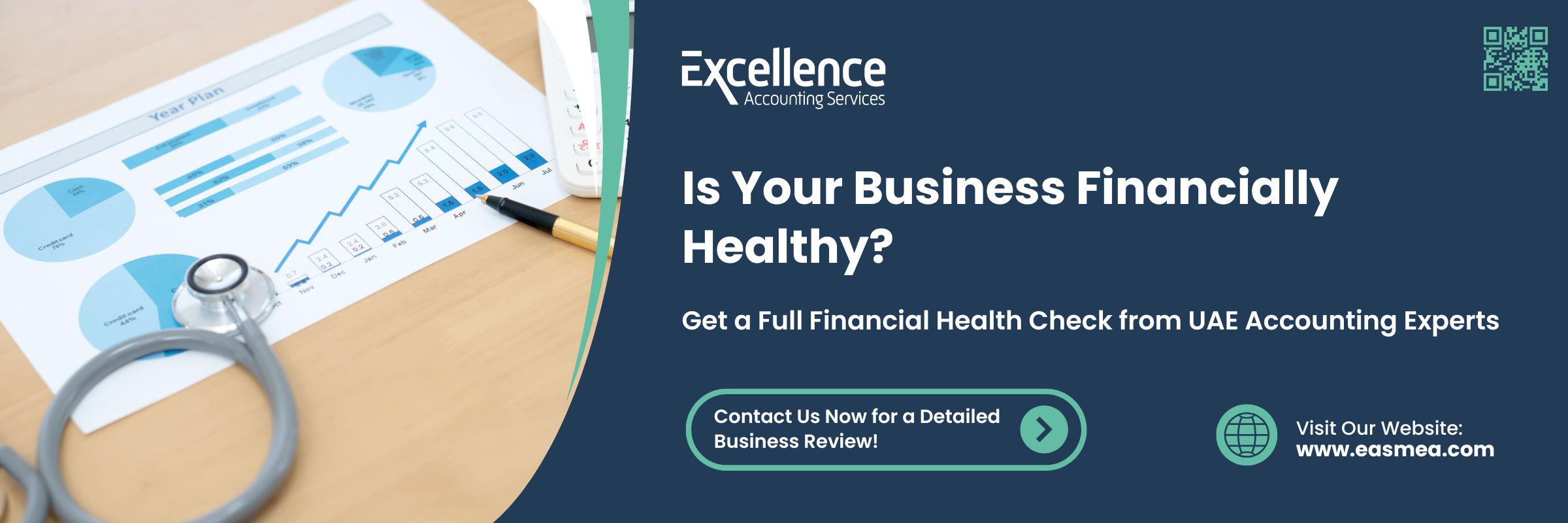Navigating the dynamic business landscape of the United Arab Emirates requires more than just a solid business plan; it demands a keen understanding of your company’s financial well-being. A financial health check for your business in UAE serves as a vital diagnostic tool, enabling you to pinpoint strengths, identify potential weaknesses, and make informed decisions. This process isn’t merely about reviewing numbers; it’s about gaining a holistic view of your business’s financial vitality within the unique economic context of the UAE.
- Decoding Your Financial Statements
- Analyzing Key Financial Health Indicators
- Conducting a Detailed Financial Health Check
- UAE-Specific Financial Considerations
- The Role of Excellence Accounting Services
- FAQ - Key Questions on Financial Health Checks in UAE
- Conclusion
- Boost Your Business Financial Health Today!
This comprehensive guide aims to demystify the process, providing you with actionable steps and insights to conduct a thorough financial assessment. We’ll delve into the intricacies of financial statements, explore key performance indicators, and address the specific considerations that businesses in the UAE must take into account, including VAT, free zone regulations, and mainland operations. By the end of this guide, you’ll have the knowledge and tools to ensure your business thrives financially in the competitive UAE market.
Key Takeaways
- Understanding and analyzing core financial statements is crucial for a financial health check.
- Key financial indicators provide insight into liquidity, profitability, and solvency.
- UAE-specific factors, such as VAT and free zone regulations, impact financial assessments.
- Regular financial health checks enable proactive decision-making and risk mitigation.
- Professional accounting services can offer valuable support and expertise.

Decoding Your Financial Statements
The Foundation: Balance Sheets & Income Statements
A financial health check for your business in UAE begins with a deep dive into your core financial statements. The balance sheet provides a snapshot of your company’s assets, liabilities, and equity at a specific point in time, revealing its financial position. The income statement, on the other hand, illustrates your revenues and expenses over a period, showcasing your profitability. Together, these statements form the bedrock of financial analysis.
In the UAE, where diverse business structures exist, understanding these statements is essential. For instance, a free zone company’s balance sheet may differ significantly from that of a mainland company due to varying regulations. Therefore, meticulous analysis of these documents, with the awareness of the Balance sheet UAE and Income statement UAE, is vital.
Cash Flow Statements: The Lifeblood of Business
While balance sheets and income statements are crucial, they don’t tell the whole story. The cash flow statement tracks the movement of cash in and out of your business, providing a clear picture of liquidity and operational efficiency. In the UAE’s fast-paced market, effective cash flow management UAE business is paramount for survival and growth.
| Feature | Balance Sheet | Income Statement | Cash Flow Statement |
|---|---|---|---|
| Purpose | Snapshot of financial position | Report of profitability | Statement of cash movements |
| Time Frame | Specific point in time | Period (e.g., month, year) | Period (e.g., month, year) |
| Key Components | Assets, liabilities, equity | Revenue, expenses, profit | Operating, investing, financing activities |
To be specific, managing accounts receivable is necessary. Delays in receiving customer payments can strain your cash flow. Implement robust credit policies and efficient invoicing systems to optimize cash collection. Additionally, maintain a healthy level of cash reserves. Unexpected expenses and fluctuating market conditions can pose financial challenges. Adequate cash reserves provide a buffer, enabling you to navigate these situations effectively.
Analyzing Key Financial Health Indicators
Liquidity Ratios: Measuring Short-Term Health
Liquidity ratios assess your business’s ability to meet its short-term obligations. In the UAE’s dynamic market, staying liquid is crucial for operational continuity. Two critical ratios are the current ratio (current assets divided by current liabilities) and the quick ratio (excluding inventory). For businesses navigating the unique financial landscape, monitoring Liquidity ratio UAE is key.
A high current ratio indicates that your business has ample liquid assets to cover its short-term liabilities. Conversely, a low current ratio may signal potential liquidity issues, demanding immediate attention to avoid financial strain. A high quick ratio shows that your business can satisfy its current obligations even without relying on the sale of inventory. Maintaining a good amount for the quick ratio, helps reduce the effects of any short term money problem.
Profitability & Solvency: Long-Term Viability
Beyond liquidity, profitability and solvency are vital for long-term sustainability. Profitability analysis UAE companies involves assessing metrics like gross profit margin and net profit margin, revealing your business’s earning power. Business solvency UAE, often measured by the debt-to-equity ratio, indicates your ability to meet long-term debt obligations.
“The average net profit margin for SMEs in the UAE ranges from 5% to 15%.”
“A debt-to-equity ratio below 1 indicates a healthy level of solvency.”
In a volatile market, ensure that pricing strategies remain competitive. Conduct market research to identify optimal pricing points that maximize profitability while remaining attractive to customers. Additionally, monitor overhead expenses closely. Implement cost-control measures to reduce unnecessary spending. Regularly reviewing expenses ensures that they align with your revenue streams.
Conducting a Detailed Financial Health Check
Step-by-Step Assessment Process
Performing a thorough financial health check for your business in UAE requires a structured approach. Firstly, compile all relevant financial documents, including balance sheets, income statements, and cash flow statements. Next, calculate key financial ratios, comparing them to industry benchmarks. Analyze trends over time to identify any significant changes. Finally, assess the impact of external factors like market conditions and regulatory changes.
- Gather comprehensive financial records.
- Compute key ratios (liquidity, profitability, solvency).
- Analyze trends over multiple periods.
- Compare results to industry standards.
- Factor in UAE-specific regulations.
In the first step, verify that all financial records are up to date and accurate. Inaccurate financial information can lead to flawed analysis and decision-making. Ensure that records are complete and reflect the true true financial position of your business. In the final step consider changes in tax laws, new regulations, and fluctuations in the real estate market.
Financial Risk Assessment & Mitigation
A crucial aspect of a financial health check is identifying and mitigating potential risks. Financial risk assessment UAE includes evaluating factors like market volatility, credit risk, and operational risks. Once identified, develop strategies to minimize their impact. This may involve diversifying revenue streams, improving credit control, or enhancing operational efficiency.
“Risk management is not about eliminating risks, but about understanding and managing them effectively.” – Peter Drucker
To avoid any unexpected risk, Diversifying your client base minimizes dependency on a single customer, reducing credit risk. Aim to build relationships with multiple clients across various industries, creating a more stable and resilient revenue stream. Regularly review your insurance coverage to ensure that it adequately protects your business against potential losses. Seek advice from insurance professionals to identify any gaps or areas where coverage can be enhanced.
UAE-Specific Financial Considerations
VAT Impact & Compliance
The introduction of VAT in the UAE has significantly impacted business finance. A financial health check must include an assessment of VAT impact business finance UAE. Ensure that your accounting systems and processes are aligned with VAT regulations to maintain compliance and avoid penalties. This includes accurate record-keeping and timely filing of VAT returns.
Businesses must regularly reconcile input and output VAT to ensure accurate reporting and compliance. Utilizing VAT-compliant accounting software and seeking professional advice from experts can simplify the process, minimizing errors and potential audits. To ensure proper submission, adhere to the deadlines and requirements set by the Federal Tax Authority (FTA) to avoid fines and penalties. Late filings or non-compliance can have serious legal and financial implications for your business.
Free Zone vs. Mainland Financial Dynamics
The UAE’s business landscape includes free zones and mainland companies, each with distinct financial regulations and reporting requirements. Understanding these differences is crucial for conducting a thorough financial health check. Free zone company finance and Mainland company finance require tailored approaches due to varying legal structures and tax implications.
| Feature | Free Zone | Mainland |
|---|---|---|
| Ownership | 100% foreign ownership | Majority local ownership required |
| Taxation | Tax-free (usually) | Corporate tax applied |
| Customs | Exempt from customs duties | Subject to customs duties |
| Operations | Trade within Free Zones and export | Trading within UAE |
Free zone companies often benefit from exemptions from corporate tax and customs duties, requiring different strategies compared to mainland businesses which need to adapt and comply with tax and custom rules. To operate in mainlands, businesses must establish strong relationships with local partners and stakeholders to navigate cultural nuances and business practices effectively. Local expertise can provide insights into market dynamics, regulatory compliance, and networking opportunities. It is also important to maintain consistent financial records to comply with local regulations and requirements.
The Role of Excellence Accounting Services
Tailored Financial Reporting & Analysis
Excellence Accounting Services specializes in preparing and analyzing financial statements that adhere to UAE accounting standards. They provide detailed reports, including balance sheets, income statements, and cash flow statements, enabling businesses to understand their financial position clearly. Furthermore, they conduct in-depth ratio analysis, comparing a company’s performance against industry benchmarks, highlighting areas for improvement, and providing valuable insights into business financial analysis UAE.
They help businesses understand critical financial indicators such as liquidity, profitability, and solvency through their analysis. This enables clients to identify trends, pinpoint potential issues, and make informed strategic decisions. They also offer customized reporting solutions that cater to the specific needs of each client. This tailored approach allows businesses to focus on their core operations while receiving accurate and timely financial information.
VAT Compliance & Advisory
Navigating the complexities of VAT in the UAE requires expert knowledge and meticulous attention to detail. Excellence Accounting Services offers comprehensive VAT compliance services, ensuring that businesses adhere to all regulatory requirements. They assist with VAT registration, filing returns, and providing advisory on VAT-related matters. Their services help businesses mitigate the risks associated with non-compliance and ensure smooth operations.
Their team stays updated with the latest VAT regulations and guidelines issued by the Federal Tax Authority (FTA). They provide proactive advice to clients on potential changes in the law, ensuring that businesses remain compliant. They also conduct regular VAT audits to identify and rectify any discrepancies in financial records. This proactive approach helps businesses avoid costly penalties and maintain a clean record with the authorities.
FAQ – Key Questions on Financial Health Checks in UAE
A comprehensive financial health check for your business in UAE involves analyzing key financial statements, including the balance sheet, income statement, and cash flow statement. These statements provide a snapshot of your company’s financial position, profitability, and cash flow, respectively. Additionally, calculating and interpreting financial ratios, such as liquidity, profitability, and solvency ratios, is crucial.
For example, liquidity ratios like the current ratio and quick ratio assess your ability to meet short-term obligations, while profitability ratios like gross profit margin and net profit margin indicate your company’s earning potential. In the UAE context, it’s also important to consider factors like VAT compliance and the specific regulations applicable to free zone or mainland companies. Regularly reviewing these components helps businesses identify potential financial risks and opportunities for improvement.
The introduction of VAT has significantly impacted the financial landscape for businesses in the UAE. Understanding and managing VAT impact business finance UAE is crucial for maintaining financial health. Businesses must ensure accurate record-keeping, timely filing of VAT returns, and proper reconciliation of input and output VAT to avoid penalties and ensure compliance.
Implementing robust accounting systems that can handle VAT calculations and reporting is essential. Additionally, seeking professional advice from accounting experts can help businesses navigate the complexities of VAT regulations and optimize their financial management. Regular audits and reviews of VAT-related processes can help identify and rectify any discrepancies, ensuring smooth financial operations.
Operating in a free zone versus a mainland company in the UAE presents distinct financial considerations. Free zone company finance often benefits from exemptions from corporate tax and customs duties, requiring different financial strategies compared to mainland company finance. Mainland companies, on the other hand, are subject to corporate tax and customs duties, necessitating compliance with local regulations.
Additionally, ownership structures differ significantly, with free zones allowing 100% foreign ownership, while mainland companies typically require a local partner. Understanding these differences is crucial for conducting an accurate financial health check and developing appropriate financial strategies. Businesses must consider these factors when assessing their financial performance and planning for future growth.
For SMEs in the UAE, essential financial health indicators include liquidity ratios, profitability ratios, and solvency ratios. Financial health indicators UAE SME are crucial for assessing the short-term and long-term financial stability of a business. Liquidity ratios, such as the current ratio and quick ratio, measure a company’s ability to meet its short-term obligations.
Profitability ratios, like gross profit margin and net profit margin, indicate the company’s earning capacity. Solvency ratios, such as the debt-to-equity ratio, assess the company’s ability to meet its long-term debt obligations. Analyzing these ratios involves comparing them to industry benchmarks and tracking trends over time. This analysis helps SMEs identify areas for improvement and make informed financial decisions.
Effective cash flow management UAE business is crucial for maintaining financial stability. Businesses should focus on optimizing accounts receivable, managing accounts payable, and maintaining adequate cash reserves. Implementing robust credit policies and efficient invoicing systems can help streamline cash collection.
Regularly monitoring cash flow statements and forecasting future cash flows can provide valuable insights into potential liquidity issues. Additionally, negotiating favorable payment terms with suppliers and maintaining a healthy level of cash reserves can help businesses navigate unexpected financial challenges.
Audited financial statements UAE provide credibility and transparency, enhancing stakeholder confidence. Audited statements ensure that financial records are accurate and comply with accounting standards. This is particularly important in the UAE, where regulatory compliance is strictly enforced.
Audited statements are often required for obtaining loans, attracting investors, and complying with legal requirements. They provide an independent assessment of a company’s financial position, reducing the risk of fraud and errors. Additionally, audited statements can help businesses identify areas for improvement in their financial management practices.
Financial risk assessment UAE is essential for identifying and mitigating potential threats to a business’s financial stability. This process involves evaluating factors such as market volatility, credit risk, and operational risks. By identifying potential risks, businesses can develop strategies to minimize their impact.
This may include diversifying revenue streams, improving credit control, or enhancing operational efficiency. Regular risk assessments help businesses anticipate and prepare for potential challenges, ensuring long-term financial health. Effective risk management is crucial in the dynamic and competitive business environment of the UAE.
Effective working capital UAE management is crucial for ensuring a business’s operational efficiency and liquidity. Working capital, which is the difference between current assets and current liabilities, represents the funds available for day-to-day operations.
Efficient management of working capital involves optimizing inventory levels, managing accounts receivable and payable, and maintaining adequate cash reserves. Proper working capital management helps businesses meet their short-term obligations and ensures smooth operations. It also helps businesses avoid liquidity issues and maintain a healthy financial position.
Small business finance UAE requires a proactive approach to financial management. Small businesses should focus on maintaining accurate financial records, monitoring cash flow, and controlling expenses. Implementing robust accounting systems and seeking professional advice can help improve financial health.
Additionally, developing a solid financial plan, setting realistic budgets, and regularly reviewing financial performance can help small businesses achieve long-term financial stability. Building strong relationships with suppliers and customers can also help improve cash flow and overall financial health.
Financial compliance UAE is crucial for maintaining legal and regulatory compliance. Businesses must adhere to various financial regulations, including VAT compliance, accounting standards, and reporting requirements.
Non-compliance can result in penalties, legal issues, and damage to a business’s reputation. Maintaining accurate financial records and seeking professional advice can help businesses ensure compliance. Additionally, staying updated with the latest regulations and implementing robust internal controls can help businesses mitigate the risks associated with non-compliance.
Conclusion
Conducting a thorough financial health check for your business in UAE is not just an exercise; it’s a strategic imperative. By understanding and analyzing your financial statements, monitoring key performance indicators, and addressing UAE-specific considerations, you can ensure your business remains financially sound and competitive.
Regular financial health checks enable proactive decision-making, risk mitigation, and sustainable growth. Remember, the dynamic business environment of the UAE demands vigilance and adaptability.




